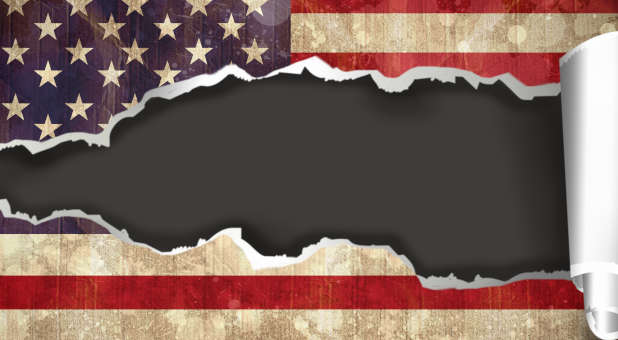Could America Become a Christian Nation Once Again?
They were called Dissenting Protestants, Nonconformists and Radical Reformers, and they were the ones who provided the philosophical and theological principles on which America was founded. They emphasized religious liberty and freedom of conscience and insisted that governmental force should never be used in matters of faith.
In this, they differed from the Catholics, Anglicans and Lutherans of that era who held to the Constantinian merger of the church with the state. This merger had led to an imperial church that used the power of the state to enforce its doctrines and advance its cause. This use of political power in matters of faith became characteristic of the medieval Roman Catholic Church.
The reforms of Martin Luther were very important, but in the area of church-state relations, he miserably failed, for he retained this Constantinian idea of a state-sanctioned church. These state-churches became oppressive and persecuted those Christians who refused to conform. Laws were passed in England and other European nations outlawing so-called “clandestine” religious gatherings.
These clandestine religious groups included the Pilgrims and Separatist Puritans who settled New England, Quakers who settled Pennsylvania, Baptists who settled Rhode Island and other freedom-minded groups scattered throughout the Colonies. Back in the Old World, they had been hounded and oppressed by the state churches. The Separatists were hounded, bullied, forced to pay assessments to the Church of England, clapped into prison on trumped-up charges and driven underground. They met in private homes, to which they came at staggered intervals and by different routes, because they were constantly being spied upon.
According to Benjamin Franklin, his father was a Dissenting Protestant who fled England in 1685 to escape persecution from the state-sanctioned Church of England, also known as the Anglican Church. Although influenced by deism in his teenage years, Franklin’s mature thinking was primarily shaped by his Dissenting Protestant upbringing and his friendship with George Whitefield, the most famous preacher of the Great Awakening.
Not the Catholic Church, nor the Anglican Church nor the Lutheran Church could provide the philosophical and theological constructs for the founding of America, for their approach to faith and church was based on power, not faith and freedom. This is why the historian Benjamin Hart wrote:
“It was Protestants of the most radical stripe, most zealous in their religious convictions (those whom the American Civil Liberties Union would like to see outlawed from the public discourse) who were in fact the greatest proponents of religious liberty as codified in America’s governing charter.” (Hyatt, “1726: The Year that Defined America,” 42).
Understanding this historical context gives understanding to the first clause of the First Amendment, which reads, “Congress shall make no law concerning the establishment of religion nor hindering the free exercise thereof.” This was not an embrace of secularism; this was a rejection of the use of governmental force in matters of conscience and faith.
The First Amendment was written to keep the government out of the church, not the other way around. This becomes even more obvious when we consider that the day after ratifying this amendment, those same founders proclaimed a National Day of Prayer and Thanksgiving.
America was Christian in its origins, but not by political, legislative action or judicial decree. America was Christian in its origins because the nonconforming, Dissenting Protestants stood strong for individual and religious liberty by rejecting the Constantinian concept of a politicized church and insisting on a free church that changes hearts and minds by the preaching of the gospel.
Sign up NOW for a FREE Charisma Magazine Online 30-day trial!
America was Christian in its origins because a Great Awakening (1726-70) had turned the masses to faith in Jesus Christ and impacted every Founding Father, as I document in my book, “1726: The Year that Defined America.” This is why John Marshall, America’s second Supreme Court chief justice, who served in that capacity for 34 years, from 1801 to 1835, could say,
“No person, I believe, questions the importance of religion in the happiness of man, even during his existence in this world. The American population is entirely Christian, and with us Christianity and religion are identified. It would be strange, indeed, if with such a people, our institutions did not presuppose Christianity, and did not refer to it, and exhibit relations with it” (Hyatt, 169).
The Christianity of America’s founding generation was organic, rising up from the people who influenced every area of American life. Yes, it is of utmost importance that Christians are socially and politically active and take seriously their responsibility to vote.
However, the path to America becoming a Christian nation once again will not pass through a politician or political party that imposes “Christian” laws and legislation upon the populace. America’s founders knew from experience that real Christians cannot be made by political force. There must be a change of hearts.
Therefore, America becoming a Christian nation once again will not be the result of a political agenda or the next election. If America becomes Christian again, it will be because of an awakened church that takes seriously its responsibility to be salt and light to this generation and fulfills the conditions of 2 Chronicles 7:14, which reads,
“If My people who are called by My name, will humble themselves and pray, and seek My face and turn from their wicked ways, then I will hear from heaven, and will forgive their sin and will heal their land. {eoa}
Join Charisma Magazine Online to follow everything the Holy Spirit is doing around the world!
Dr. Eddie Hyatt is a historian, Bible teacher and revivalist. This article was derived from his book, 1726: The Year that Defined America, available from Amazon and his website at www.eddiehyatt.com.














































